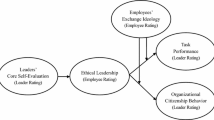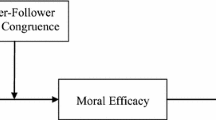Abstract
This study examined how leaders’ moral competence is linked to employees’ task performance and organizational citizenship behaviors. Based on a sample of 102 employee–supervisor pairs from seven organizations in South Korea, the results of this study revealed that leaders’ moral competence was positively associated with employees’ task performance and organizational citizenship behaviors toward leaders (OCBS). As expected, employees’ psychological empowerment partially mediated the relationship between leaders’ moral competence and employees’ task performance and OCBS. Furthermore, person–supervisor fit (PS fit) moderated the relationship between leaders’ moral competence and employees’ psychological empowerment such that the relationships became stronger for individuals higher rather than lower in PS fit.




Similar content being viewed by others
References
Adkins, C. L., & Russell, C. J. (1997). Leader–subordinate work value congruence and subordinate performance: A pilot study. Journal of Business and Psychology, 12(2), 205–218.
Aiken, L. S., & West, S. G. (1991). Multiple regression: Testing and interpreting interactions. Thousand Oaks: Sage.
Alge, B. J., Ballinger, G. A., Tangirala, S., & Oakley, J. L. (2006). Information privacy in organizations: Empowering creative and extra-role performance. Journal of Applied Psychology, 91(1), 221–232.
Andre, B., & Werner, W. W. (2005). Simulation study on fit indexes in CFA based on data with slightly distorted simple structure. Structural Equation Modeling, 12(1), 41–75.
Aryee, S., Budhwar, P. S., & Chen, Z. X. (2002). Trust as a mediator of the relationship between organizational justice and work outcomes: Test of a social exchange model. Journal of Organizational Behavior, 23(3), 267–285.
Ashforth, B. (1990). The organizationally induced helplessness syndrome: A preliminary model. Canadian Journal of Administrative Sciences, 7(3), 30–36.
Avolio, B. J., Bass, B., & Jung, D. (1999). Re-examining the components of transformational and transactional using multi-factor leadership questionnaire. Journal of Occupational and Organizational Psychology, 72(4), 441–462.
Avolio, B. J., Zhu, W., Koh, W. L., & Bhatia, P. (2004). Transformational leadership and organizational commitment: Mediating role of psychological empowerment and moderating role of structural distance. Journal of Organizational Behavior, 25(8), 951–968.
Baron, R. M., & Kenny, D. A. (1986). The moderator-mediator variable distinction in social psychological research: Conceptual, strategic and statistical considerations. Journal of Personality and Social Psychology, 51(6), 1173–1182.
Bass, B. M., & Steidlmeier, P. (1999). Ethics, character, and authentic transformational leadership behavior. Leadership Quarterly, 10(2), 181–217.
Brislin, R. W. (1986). The wording and translation of research instrument. In W. J. Lonner & J. W. Berry (Eds.), Field methods in cross-cultural research (pp. 137–164). Beverly Hills: Sage.
Brown, M. E., Treviño, L. K., & Harrison, D. A. (2005). Ethical leadership: A social learning perspective for construct development and testing. Organizational Behavior and Human Decision Processes, 97(2), 117–134.
Byrne, D. (1971). The attraction paradigm. New York: Academic Press.
Cable, D. M., & DeRue, D. S. (2002). The convergent and discriminant validity of subjective fit perceptions. Journal of Applied Psychology, 87(5), 875–884.
Colbert, B. A. (2004). The complex resource-based view: Implications for theory and practice in strategic human resource management. Academy of Management Review, 29(3), 341–358.
Coles, R. (Ed.). (1997). The moral competence of children: How to raise a moral child. New York: NAL/Dutton.
De Hoogh, A. H. B., Den Hartog, D. N., Koopman, P. L., Thierry, H., Van den Berg, P. T., Van der Weide, J. G., et al. (2005). Leader motives, charismatic leadership, and subordinates’ work attitude in the profit and voluntary sector. Leadership Quarterly, 16(1), 17–38.
Deci, E. L., Connell, J. P., & Ryan, R. M. (1989). Self-determination in a work organization. Journal of Applied Psychology, 74(4), 580–590.
Dineen, B. R., Lewicki, R. J., & Tomlinson, E. C. (2006). Leadery guidance and behavioral integrity: Relationships with employee citizenship and deviant behavior. Journal of Applied Psychology, 91(3), 622–635.
Edwards, J. R., & Lambert, L. S. (2007). Methods for integrating moderation and mediation: A general analytical framework using moderated path analysis. Psychological Methods, 12(1), 1–22.
Erdogan, B., & Bauer, T. N. (2005). Enhancing the career benefits of proactive personality: The role of fit with jobs and organizations. Personnel Psychology, 58(4), 859–891.
Folger, R. (1998). Fairness as a moral virtue. In M. Schminke (Ed.), Managerial ethics: Moral management of people and processes (pp. 13–34). Mahwah, NJ: Erlbaum.
Gecas, V. (1989). The social psychology of self-efficacy. Annual Review of Sociology, 15(8), 291–316.
Giardini, A., & Frese, M. (2008). Linking service employees’ emotional competence to customer satisfaction: A multilevel approach. Journal of Organizational Behavior, 29(2), 155–170.
Gouldner, H. B. (1960). The organization woman: Patterns of friendship and organizational commitment. Unpublished doctoral dissertation, University of California, Los Angeles.
Hackman, J. R., & Oldham, G. R. (Eds.). (1980). Work redesign. Reading, MA: Addison-Wesley.
Hass, A. (Ed.). (1998). Doing the right thing: Cultivating your moral competence. New York: Hardcover.
House, R. J., Hanges, P. J., Javidan, M., Dorfman, P. W., & Gupta, V. (Eds.). (2004). Culture, leadership, and organizations. Thousand Oaks, CA: Sage.
Ilies, R., Scott, B. A., & Judge, T. A. (2006). The interactive effects of personal traits and experienced states on intraindividual patterns of citizenship behavior. Academy of Management Journal, 49(3), 561–575.
Kanfer, R., & Ackerman, P. L. (1989). Motivation and cognitive abilities: An integrative aptitude-treatment interaction approach to skill acquisition. Journal of Applied Psychology, 74(4), 657–690.
Kanter, R. M. (Ed.). (1983). The change masters. New York: Simon and Schuster.
Keller, T., & Dansereau, F. (1995). Leadership and empowerment: A social exchange perspective. Human Relations, 48(2), 127–146.
Kim, T.-Y., Cable, D. M., Kim, S., & Wang, J. (2009). Emotional competence and work performance: The mediating effect of proactivity and the moderating effect of job autonomy. Journal of Organizational Behavior, 30(7), 983–1000.
Koberg, C. S., Boss, R. W., Senjem, J. C., & Goodman, E. A. (1999). Antecedents and outcomes of empowerment: Empirical evidence from the health care industry. Group and Organization Management, 24(1), 71–91.
Krishnan, V. R. (2002). Transformational leadership and value system congruence. Journal of Value-Based Management, 15(1), 19–33.
Kristof-Brown, A. L., Zimmerman, R. D., & Johnson, E. C. (2005). Consequences of individuals’ fit at work: A meta-analysis of person-job, person-organization, person-group, and person-leader fit. Personnel Psychology, 58(2), 281–342.
Lambert, S. J. (2000). Added benefits: The link between work-life benefits and organizational citizenship behavior. Academy of Management Journal, 43(5), 801–815.
Law, K. S., Wong, C. S., & Song, L. J. (2004). The construct and criterion validity of emotional competence and its potential utility for management studies. Journal of Applied Psychology, 89(3), 483–496.
Lennick, D., & Kiel, F. (2005). Moral competence: Enhancing business performance and leadership success. New Jersey: Wharton School Publishing.
Liden, R. C., Wayne, S. J., & Sparrowe, R. T. (2000). An examination of the mediating role of psychological empowerment on the relations between the job, interpersonal relationships, and work outcomes. Journal of Applied Psychology, 85(3), 407–416.
Lynch, P. D., Eisenberger, R., & Armeli, S. (1999). Perceived organizational support: Inferior-versus-superior performance by wary employees. Journal of Applied Psychology, 84(4), 467–483.
Meglino, B. M., & Ravlin, E. C. (1998). Individual values in organizations: Concepts, controversies, and research. Journal of Management, 24(3), 351–389.
Mirvis, P., & Kanter, D. L. (1989). Combating cynicism in the workplace. National Productivity Review, 8(4), 377–394.
Morris, L. (1996). Training, empowerment, and change. Training and Development, 50(7), 54.
Murray, R. K., & Blessing, T. H. (1983). The presidential performance study: A progress report. Journal of American History, 70(3), 535–555.
Payne, S. C., & Huffman, A. H. (2005). A longitudinal examination of the influence of mentoring on organizational commitment and turnover. Academy of Management Journal, 48(1), 158–168.
Ridings, W. J., Jr., & McIver, S. B. (Eds.). (1997). Rating the presidents. Secaucus, NJ: Carol Publishing Group.
Riggio, R. E. (1986). Assessment of basic social skills. Journal of Personality and Social Psychology, 51(3), 649–660.
Riggio, R. E. (2002). Multiple competences and leadership: An overview. In R. E. Riggio, S. E. Murphy, & F. J. Pirozzolo (Eds.), Multiple competences and leadership (pp. 1–6). Mahwah, NJ: Lawrence Erlbaum Associates Publishers.
Riggio, R. E., Murphy, S. E., & Pirozzolo, F. J. (Eds.). (2002). Multiple competences and leadership. Mahwah, NJ: Lawrence Erlbaum Associates Publishers.
Rubenzer, S. J., Faschingbauer, T. R., & Ones, D. S. (2000). Assessing the U.S. presidents using the revised NEO personality inventory. Assessment, 7(4), 403–420.
Schaubroeck, J., & Lam, S. S. K. (2002). Dispositional similarity, group homogeneity and organizational advancement in different cultures. Academy of Management Journal, 45(6), 1120–1136.
Smith, R. N., Brinkley, D., Splaine, J., & Medford, E. G. (2000). American presidents: Life portraits. C-SPAN survey of presidential leadership, from http://www.americanpresidents.org/survey/historians.
Spector, P. E. (1986). Perceived control by employees: A meta-analysis of studies concerning autonomy and participation at work. Human Relations, 39(11), 1005–1016.
Spreitzer, G. M. (1995). Psychological empowerment in the workplace: Dimensions, measurement, and validation. Academy of Management Journal, 38(5), 1442–1465.
Spreitzer, G. M., De Janesz, S., & Quinn, R. E. (1999). Empowered to lead: The role of psychological empowerment in leadership. Journal of Organizational Behavior, 20(4), 511–526.
Stajkovic, A. D., & Luthans, F. (1998). Self-efficacy and work-related performance: A meta-analysis. Psychological Bulletin, 124(2), 240–261.
Stine, R. (1989). An introduction to bootstrap methods: Examples and ideas. Sociological Methods and Research, 18(2), 243–291.
Van Dyne, L., & Pierce, J. L. (2004). Psychological ownership and feelings of possession: Three field studies predicting employee attitudes and organizational citizenship behavior. Journal of Organizational Behavior, 25(4), 439–459.
Wat, D., & Shaffer, M. A. (2003). Equity and relationship quality influences on organizational citizenship behaviors: The mediating role of trust in the leader and empowerment. Personnel Review, 34(4), 406–422.
Wayne, S. J., & Liden, R. C. (1995). Effects of impression management on performance ratings: A longitudinal study. Academy of Management Journal, 38(1), 232–260.
Williams, L. J., & Anderson, S. E. (1991). Job satisfaction and organizational commitment as predictors of organizational citizenship and task behaviors. Journal of Management, 17(3), 601–617.
Witt, L. A. (1998). Enhancing organizational goal congruence: A solution to organizational politics. Journal of Applied Psychology, 83(4), 666–674.
Zhu, W., May, D. R., & Avolio, B. J. (2004). The impact of ethical leadership behavior on employee outcomes: The roles of psychological empowerment and authenticity. Journal of Leadership and Organizational Studies, 11(1), 16–26.
Acknowledgments
The work described in this paper was supported by a grant from China Europe International Business School. We thank Robert Liden and Jonathan Kwok for their initial support on earlier versions.
Author information
Authors and Affiliations
Corresponding author
Rights and permissions
About this article
Cite this article
Kim, TY., Kim, M. Leaders’ Moral Competence and Employee Outcomes: The Effects of Psychological Empowerment and Person–Supervisor Fit. J Bus Ethics 112, 155–166 (2013). https://doi.org/10.1007/s10551-012-1238-1
Received:
Accepted:
Published:
Issue Date:
DOI: https://doi.org/10.1007/s10551-012-1238-1




